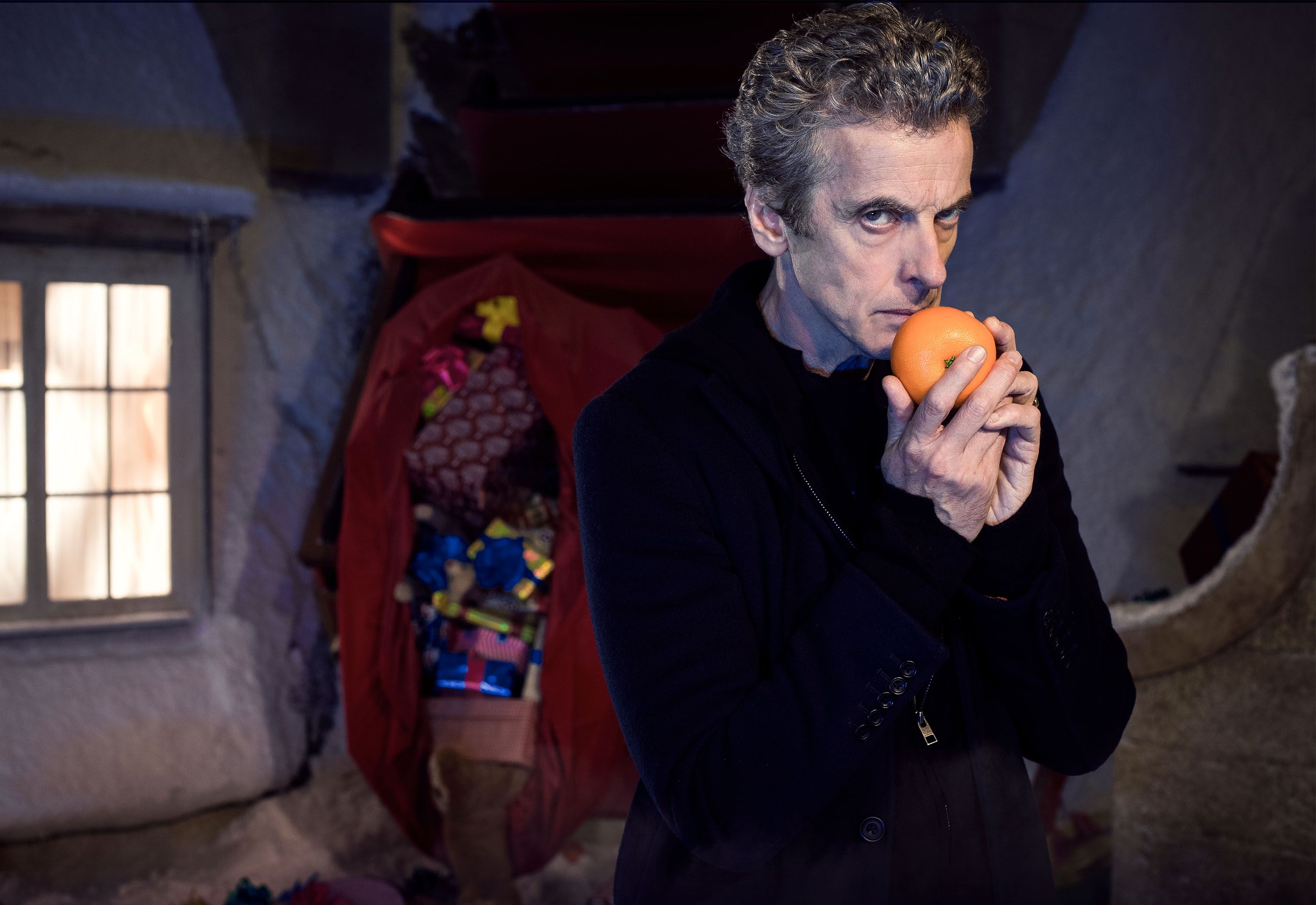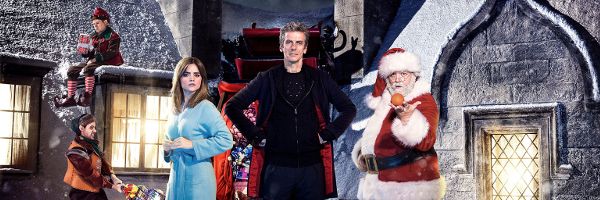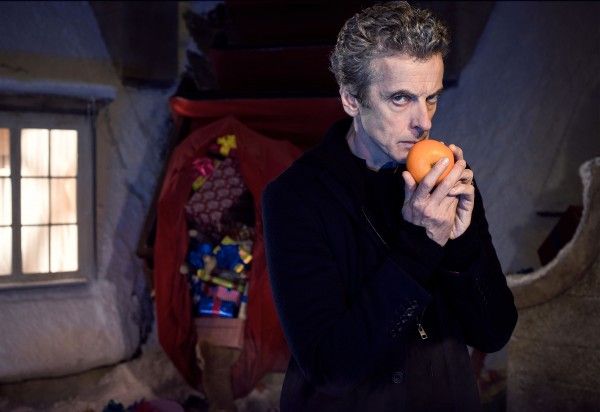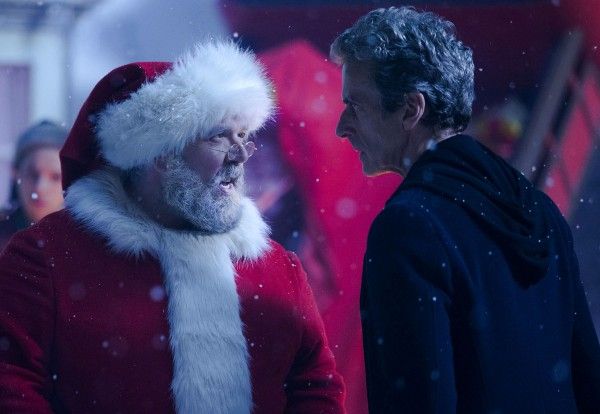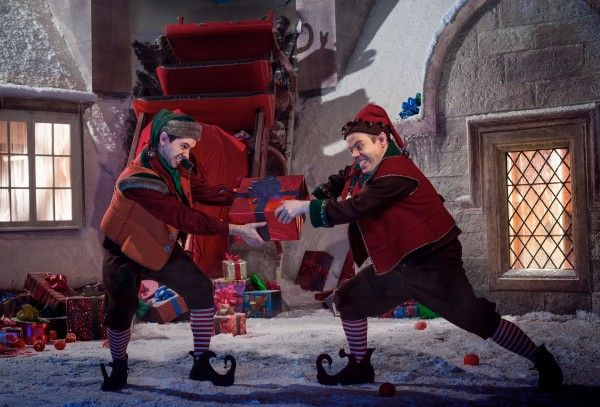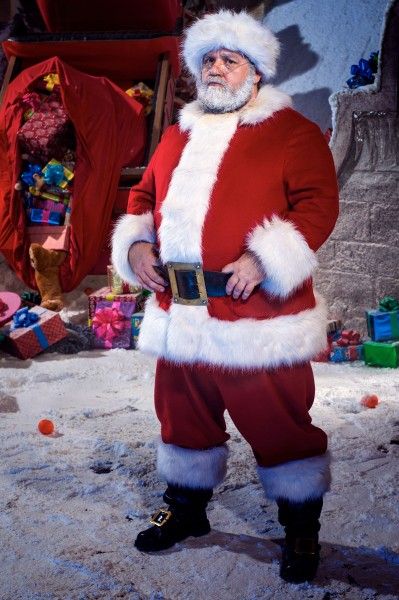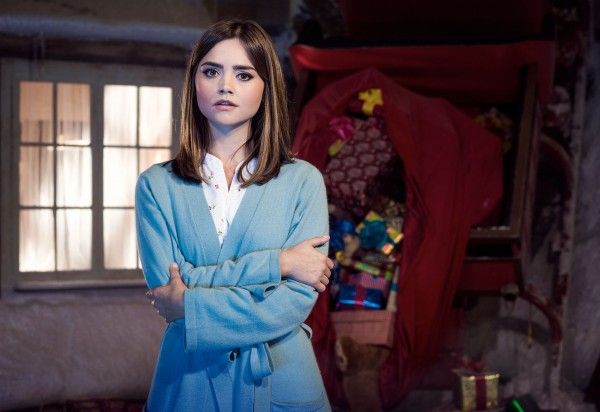Airing both in the US and UK on Christmas Day, in Doctor Who: Last Christmas, it’s Christmas in the North Pole and the Doctor (Peter Capaldi) and Clara (Jenna Coleman) are joined by Santa Claus (Nick Frost) and some grumpy elves for an all-new adventure. It is the tenth Christmas special since the show’s revival in 2005, and the first full Christmas special to feature the Twelfth Doctor.
During this interview with press to promote the upcoming special, showrunner Steven Moffat talked about why Doctor Who and Christmas have a special relationship, the challenges of plotting and planning a Christmas special, why it took so long to use Santa Claus as a plot point, how Nick Frost came to be cast in the role, the Doctor’s view on Santa Claus versus Robin Hood, getting more clarity on where the relationship between the Doctor and Clara stands now, why companions typically end up being contemporary characters, his fondest memories of writing his five Christmas specials, and the best Doctor Who merchandise he’s received. Check out what he had to say after the jump.
Question: Doctor Who and Christmas seem to have a special relationship and really compliment each other. Why do you think that is?
STEVEN MOFFAT: Doctor Who isn’t like other sci-fi shows because it’s more magical than that. It’s a magic man in a magic box, dressed up in sci-fi language. Aesthetically, it feels like something closer to Narnia, at times. It’s not all the way to Narnia, but it’s closer to that tradition. It’s a big-hearted, optimistic show that does, of course, have monsters that want to commit genocide of the entire universe, but apart from that, it is a big-hearted, optimistic show. It features, at its core, this improbable man with a time machine who does feel like the science fiction equivalent of Santa Claus. It’s also, certainly in Britain, a show that is beloved by families. Families watch it together, and Christmas is about family. It’s not a show that children tolerate for their parents, or that parents tolerate for their children. It’s a show that the entire family utterly engages in. So, it feels fairly right for Christmas day.
As a fan, when did you first start noticing that connection?
MOFFAT: I think I always had a vague wish that Doctor Who would meet Santa Claus, when I was a kid, but I never thought about it more than that. The classic series once has a Christmas episode purely by accident because it happened to fall on Christmas day. The first time I thought about a Christmas special was when Julie Gardner told me that they were going to do David Tennant’s first episode as a Christmas special on Christmas day, and I thought it sounded wonderful. I thought Doctor Who would improve any day.
Because he can manipulate time and space and has lived a long time, do you think Santa Claus could be a good Time Lord?
MOFFAT: Watch on Christmas day and find out.
As a writer, what is your process of planning and plotting a Christmas special, every year, and what are the challenges?
MOFFAT: It’s not massively different from just writing an episode of Doctor Who. The thing about Doctor Who and the way we approach it, and it’s paid off, is that I often say to every writer, or myself when I’m the writer, is that every episode of Doctor Who has to be an event. It has to be the thing that everybody is talking about, that day. So, when we come to do the Christmas special, which has to be an event episode, we’re used to that. The additional things that are different about Christmas, although not massively different, is that we have to remember that a lot of people will be forced into watching it that don’t normally watch Doctor Who. Parents will get dragged in. You have to have a quite basic version of Doctor Who, but when I say that, I’m lying because that actually happens with every episode of Doctor Who. People, certainly in Britain, know Doctor Who incredibly well, so it doesn’t need a lot of introduction, even for people who don’t watch it that often. The other challenge is that I do think a Christmas special should be Christmas-y. There’s no point in trying to pretend that an ordinary episode should pass muster on Christmas day. It wouldn’t. It’s a highly sugared day. People are exhausted by 6 o’clock. They’ve had food and been drinking champagne since 10 o’clock in the morning, and they’ve eaten an amount of chocolate that would kill a horse. So, you have to cut through an even louder living room than normal with your story. All these things are just exaggerations of Doctor Who. Doctor Who is always like that. I don’t know how clear it is to an American audience, and sometimes in the way they react to it, I wonder if it’s very unclear to them, but Doctor Who is an early evening Saturday show in Britain. It’s surrounded by shiny floor shows. It’s shown in houses full of children, all yelling and talking at once, and mom and dad doing the cooking, and maybe a Hoover. It has to be a loud clarion call of a show to survive all of that. I know you guys watch it later in the evening and I sometimes think it must seem a bit loud for 9 o’clock, but it seems to be going very well, so I shouldn’t complain.
Why did it take so long for someone to use Santa as a plot point in a Christmas special for Doctor Who?
MOFFAT: The dull answer is that it took me this long to think of it. I think it’s also true that now that now that this is Doctor Who’s 10th year at the heart of the Christmas schedule, he’s now earned the right to go toe-to-toe with Santa. It feels about right. It’s one of those ideas that when you have it, you think, “For goodness sake, why hasn’t it happened before now? Why haven’t we seen them in a buddy movie before now? They belong together.” In the hearts of the younger part of our audience, Doctor Who, Santa Claus and Robin Hood all live very much in the same place. It’s irresistible once you’ve thought of it. Also, because of the format of the show, we can contrive anything to happen, so here we are.
Well, thank you for casting Nick Frost as Santa Claus. His name screams Christmas and Santa.
MOFFAT: Nicholas Frost is the name Santa would choose, if he was going for a nome de plume. It’s much better than Kris Kringle.
How did the casting of Nick Frost come about?
MOFFAT: The casting director drew up a list of potential Santas and Nick Frost’s name leapt out at us a bit because he looks like Santa, he’s really cool, kids loved him, and he is the funky sort of Santa that Doctor Who would have. He’s the right Santa for Doctor Who-land.
As Santa, does he have better eyebrows than Peter Capaldi?
MOFFAT: Nobody has better eyebrows than Peter Capaldi.
How did Dan Starkey, who usually plays Strax, come to play one of the elves in this episode?
MOFFAT: We thought it would be nice for him not to have to wear so much rubber, and I’m talking about his professional life, not his personal life. He’s a very, very good and very, very funny actor. We’ve always thought we should allow him to have his own face on screen just once in Doctor Who. He’s such a trooper for our show. He’s spent so many hours in that make-up chair being turned into an angry potato that it’s nice to let him out of it. And when I started to write Christmas and I was writing quite grumpy elves, he’s got the comedic gifts and he’s got the height, frankly, to play this part, so I wanted to get him in. He’s a very, very funny actor, and he’s just nice. He’s been in three consecutive Christmas specials, which is a record for a non-regular.
How much time will have elapsed, from the end of last season until the Christmas episode?
MOFFAT: As always with Doctor Who, the gap of time sort of reflects the amount of time it’s been off the air. It’s a matter of months.
We’ve seen the Doctor go toe-to-toe with Robin Hood, and he didn’t even quite believe that Robin Hood existed. What is his view on Santa Claus?
MOFFAT: Well, you’ll have to wait for the show to find that out, quite honestly. He has a different relationship with Santa Claus. In a line cut from the Robin Hood episode, which I rather regret now, while dismissing the existence of Robin Hood, the Doctor absolutely asserts that Santa is real. We know that the Doctor has a conviction about Santa. He’s mentioned him several times. So, it’s a different thing. His conflict with Robin Hood was more externalizing his angst about whether he really counts as a hero or not. And let’s be honest, the Doctor doesn’t really like it when a dashing, handsome young man turns up and the girl at his side is a bit more impressed with the new hero than the old one. He didn’t like it when Captain Jack turned up, and he didn’t like it when Robin Hood turned up. What middle-aged man wants that kind of competition?
In the last episode, we saw that Clara and the Doctor cut ties. Are we going to see more clarity on where they are in their relationship, with this new episode?
MOFFAT: Yeah, we carry on with that story. We’re not ignoring it. As it ended, they parted forever, having lied to each other, and that is where we find them again. We don’t just ignore it because it’s Christmas. It very much engages with that storyline. At first, you’ll think we’re ignoring it, and then you’ll realize that we’re really not.
The tone of the Christmas episode seems to be lighter than the last episode of the season. Was that intentional, to show that everything hasn’t gotten so bleak?
MOFFAT: Well, it’s Doctor Who storytelling at its most primal. If you do something incredibly dark, where another show would just have another episode with sad music and rain, we just spin it right around and do something outrageous. That’s the show biz of Doctor Who. And when Santa walks onto the Tardis, I like that moment because it feels like, “Did you forget you were watching Doctor Who?” It’s not really Chekhov. We are having fun here. Santa will solve everything. That makes it Doctor Who again. Just when you’re thinking this is as dark as it gets, all your childhood dreams come true when Father Christmas enters the Tardis.
Russell T. Davies introduced the concept of the Doctor turning his friends into weapons, and you picked up the baton in your run of the series, with the Doctor seemingly believing that his companions always leave worse off than they arrive. Is that something that you think needs to be universal, or in the future, might we see a happier ending for some of these folks?
MOFFAT: That’s not true about all of the Doctor’s companions. It’s maybe what the Doctor thinks in some of his darker moments. When he’s dying in “Let’s Kill Hitler,” he worries that he might have done them terrible harm. But Rose is off in a parallel universe with a human version of the Doctor, and she’s fine. Martha learned to stand up for herself and get over her crush on the Doctor. Donna has a more miserable thing, but she doesn’t know she’s miserable. She ended up quite happy and married to a good bloke. Rory and Amy are perfectly happy in New York. They’re dead, but everyone from that era is dead, so that’s all right. They all don’t leave under terrible circumstances, at all. I think the tragedy with Amy and Rory was that the Doctor lost them. In the end, Amy chose Rory over the Doctor, in a heartbeat, and he actually had some trouble dealing with that. But the fact is that he doesn’t ruin their lives. There’s a certain amount of trauma, it must be said, but they’re not all destroyed, by any means. Every time the Doctor loses a regular character from the show, it will happen in a moment that makes people talk. If a friendship is severed, for good or for bad reasons, that’s a big moment in your life. If you walk away from a great friend and you’re not crying a little, then you’ve not been paying attention. So, Doctor Who will not take the undramatic path. We’d like to stay on television and be popular.
In the modern era of Doctor Who, we’ve seen a bunch of folks from modern-day Britain, but that wasn’t always the case in the old series. How much harder is it to write for a companion that isn’t just from modern-day earth?
MOFFAT: It’s not a question of whether it’s difficult to do or not. It’s a question of whether it’s the right thing to do or not. The old series didn’t do a hell of a lot of it. If you look at the vast majority of companions, they come from contemporary earth. Even the ones that don’t come from contemporary earth, they’re pretty much normalized. I don’t see it as an unsolvable problem, but the majority solution will always be a contemporary companion. The problem is that you need an anchoring point for the audience. You need someone who represents their world and their point of view. The simplest, purest and best answer for that is somebody from their world. Somebody who’s watched Doctor Who for an unseasonably long time, like I have, might get bored of that and say, “Oh, I wish she was a two-headed alien,” but the new audience doesn’t think that. They want an anchoring point on that mysterious alien, the Doctor. It doesn’t mean we’ll always do it this way, but the reality is that it’s always going to be somebody from contemporary earth, or somebody who ends up being very like somebody from contemporary earth. The one that really broke the mold, I would argue, was Leela. They actually went for somebody who was quite different. It’s got to be the relatable half of the partnership. Keep in mind that Doctor Who has to not just appeal to sci-fi fans, but it has to appeal to a huge mainstream audience that dwarfs the sci-fi audience, and it needs that way in for them. Having said that, who knows? Maybe it will be a robot dog next. I don’t know.
Previously, companions would spend most of their time with the Doctor in the Tardis, but now, they try to live their own life while also traveling with the Doctor. Is that the new normal?
MOFFAT: There’s never going to be a new normal. Everybody who comes aboard the Tardis will have a different story and do it a different way. Clara’s personality did not suit the idea of simply abandoning everything else she does and running off with the Doctor. You wouldn’t believe it, if I wrote that. But Amy, the night before her wedding, was all anxious about whether she was getting married too young, and she could run away for awhile. You’ve gotta look at the Doctor as somebody who’s got a fantastic car that likes to take people for a spin now and then, but doesn’t need you to move in. Rose was in a very different place. She didn’t like her job, she had a vexed relationship with her mother, she had a boyfriend she wasn’t sure of. She ran away because that was right for her character. It’s purely about whether or not you’d run away, and whether or not you’d mind being number two in this particular relationship. From the first moment you meet Clara, you know that she’s never going to be somebody who wants to live in the spare room. That’s just not what she’s like. That doesn’t mean that the next one won’t be like that. Who knows.
This is your fifth Christmas special, but which was your favorite one to write?
MOFFAT: That’s difficult to say. I better say this one, otherwise I’m not promoting the show very well. I have different memories of them. I have very fond memories of trying to write “A Christmas Carol” in L.A. I got stuck out in L.A. because of that volcano, and we had just been doing the tour of Matt Smith’s Doctor. So, I was stuck in sweltering L.A. with all of the air conditioning turned on and playing Christmas music, trying to get myself in the mood. That was quite fun. And then, I wrote the last third of this Christmas special, on the world tour with Peter and Jenna. My principal memory of that, which is now very fond, but at the time, I slightly resented, was watching them have a high old time in bars and pubs and cafés, and I’d be sitting by myself, at a table in the corner, trying to write Doctor Who. I remember thinking, “My job isn’t very glamorous, is it?” Overall, insofar as rating it as ever enjoyable, to be able to write dialogue between the Doctor and Santa Claus is as good as it gets.
Being a life-long Doctor Who fan yourself, is there a great Doctor Who toy or gift that you received for the holidays?
MOFFAT: Yes, I can recall getting a full-size Dalek. It’s quite easy for me to recall that because that happened last year. It’s in the corner of my office. My wife got me a Dalek for last Christmas. I never got a Dalek as a kid, but I got one as an adult.
Did you get anything in your childhood?
MOFFAT: There wasn’t much merchandise, back in the day. I would have longed for a sonic screwdriver, but they never sold them. I don’t think I ever got a big Doctor Who thing when I was a kid.
Doctor Who: Last Christmas airs in the US and UK on Christmas Day.

